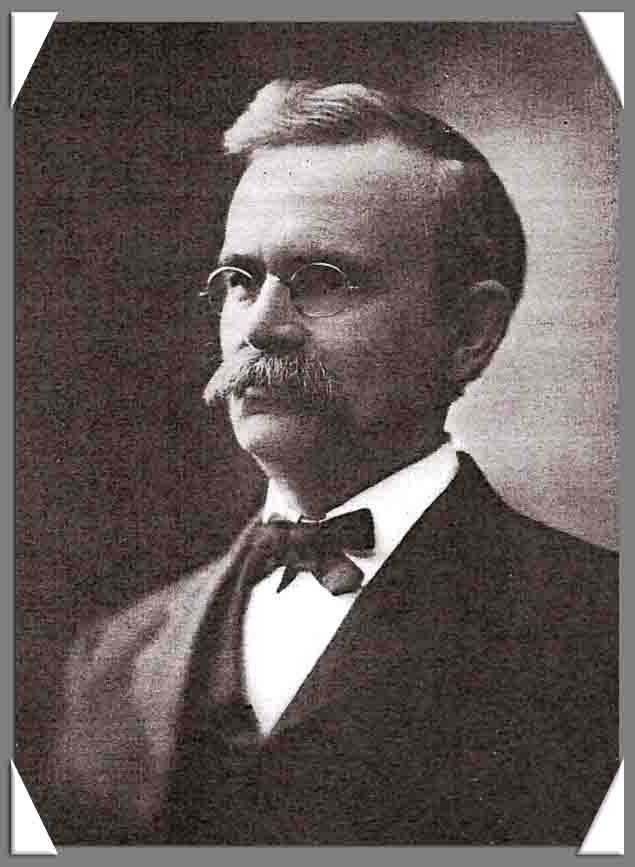Judge George W. Dunham, occupying the bench of the
tenth judicial district and long known as an able and learned member of the
Delaware county bar, was born in Jones county, Iowa, January 13, 1857. His
father, Francis W. Dunham, was a native of Bakersfield, Vermont, born July 20,
1830. In 1855 he came to the west, settling on Bowen's Prairie, in Jones county,
Iowa, where he remained until 1856. He then came to Delaware county with a
little colony which started a settlement where the town of Almoral now stands.
The school was established there and Mr. Dunham engaged as teacher. Later he
removed to Earlville, where he continued teaching for two years, after which he
became principal of the public schools of Manchester, remaining at the head of
the educational system of this city for three years. In the fall of 1867 he was
elected county superintendent, resigning his position as principal to accept the
office. He entered upon the duties of the position on the 1st of January, 1868,
but was then in delicate health and death had already marked him as a victim, he
passing away on the 7th of the same month. His wife, Mrs. Ann M. Dunham, was
born in Bakersfield, Vermont, December 17, 1835. Several years after the death
of her first husband, or on the 4th of November, 1875, she became the wife of E.
Cummings Sanborn. By the first marriage there were three children: George W.;
Mary, who died in childhood; and Laura E., who married Charles H. Barrett of
Vermilion, South Dakota.
|
Judge Dunham has spent
practically his entire life in Delaware county. His preliminary education
was acquired in the public schools of Manchester and later he attended the
State University at Iowa City. In preparation for a professional career he
became a law student in the office and under the direction, of A. S.
Blair, a practicing attorney of Manchester, and afterward entered the law
department of the State University, from which he was graduated in June,
1879. He soon returned to Manchester, where he entered into partnership
with his former preceptor, a fact which indicates the excellent record
which he had made in his student days for reliability and trustworthiness
as well as for devotion to his chosen calling. The partnership relation
continued for a number of years.
On the 6th of February, 1890, Judge Dunham was appointed postmaster of
Manchester and while discharging the duties of that position continued
also in the practice of law. Afterward a third partner was admitted to the
firm under the style of Blair, Dunham & Norris and when the senior partner
was elected to the bench the remaining two partners were joined by a third
under the firm name of Dunham, Norris & Stiles. This connection was
continued until 1912, after which time Judge Dunham practiced alone. His
power in the courts naturally led to his selection for judicial honors
when in March, 1913, it devolved upon Governor Clark to appoint some one
to fill the vacancy on the bench of the tenth judicial district caused by the resignation of Judge Ransier.
Judge Dunham was |
 |
chosen and is now acting in that capacity and his
decisions are characterized by a masterful grasp of every problem presented for
solution. He also served as a member of the twenty eighth and twenty ninth
general assembly and as a member of the senate, representing Delaware and
Buchanan counties, in the thirtieth, thirty first and thirty second sessions.
During the thirty second session he served as chairman of the committee which
compiled the code supplement (1907) codifying the laws of the state enacted
after the adoption of the code of 1897 and annotating the entire statutes.
On the 9th of October, 1884, Judge Dunham was united in
marriage to Miss Effie May Blair, a daughter of his old law partner, Judge
Blair, and they have become the parents of three children: Francis, who wedded
Josephine Lehn; Harold, who married Bessie McGee and has a little daughter, Jean
Elizabeth; and Laura, a student in Oberlin College of Oberlin, Ohio. The family
is a prominent one in Manchester and throughout Delaware county, the members of
the household occupying a leading position in social circles. The name of Dunham
has also long been associated with movements for the upbuilding and benefit of
city and county and in a profession where advancement depends entirely upon
individual merit and ability Judge Dunham has gained more than local
distinction. |